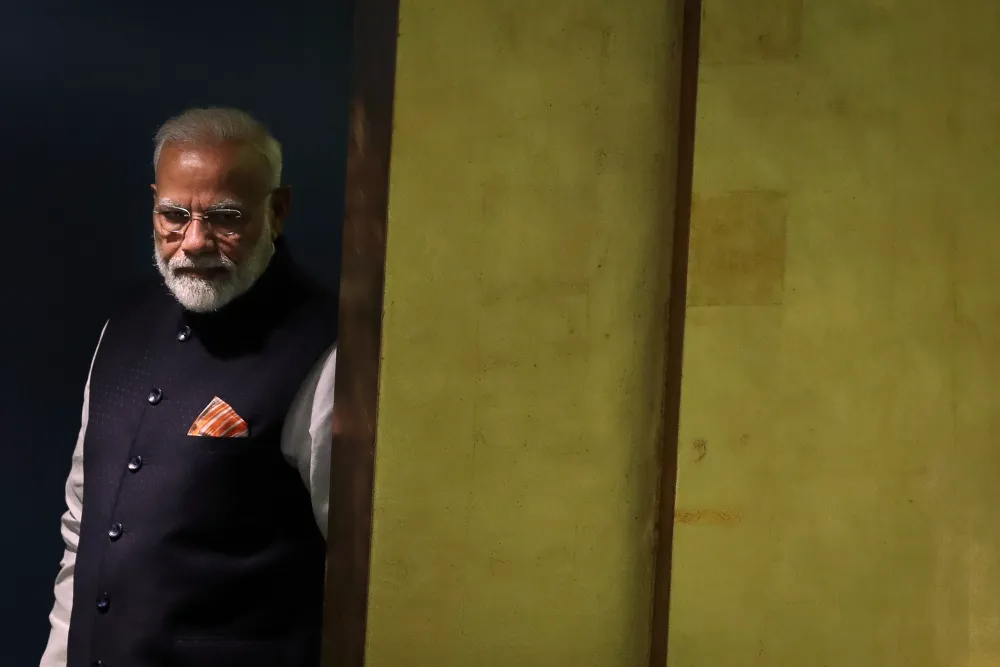With two decades having elapsed since the infamous Gujarat Riots of 2002, no discourse on the subject has excluded mention of Narendra Modi, the Indian Prime Minister. While most academics have denounced the state’s then-chief minister’s role in the violence that primarily targeted Muslims, staunch supporters of Modi have asserted his innocence. The twenty years since the riots may have erased some memories of the witnessed horrors and catapulted Modi to the heights of celebrity and notoriety, but they undoubtedly earned him friends across borders who continue to vouch for him today. One of these allies is Lord Ranger, a current member of the British House of Lords, who has come under fire for his controversial remarks in the wake of the BBC documentary on Modi.
Modi: The Friends in High Places
After the first episode of the BBC documentary series on Modi’s relationship with India’s Muslims, which included a UK government report critical of Modi’s actions during the Gujarat anti-Muslim pogrom in 2002, the Indian government used emergency regulations to impose a ban on the program.
On the other hand, Lord Raminder “Rami” Singh Ranger denounced the BBC’s “insensitive, one-sided documentary” in a letter to Tim Davie, the director general, dated January 20.
In the letter, which closely mirrored the official narrative of the Modi government, he claimed that the BBC documentary had reopened old wounds by inciting animosity between British Hindus and Muslims by making India out to be an intolerable country where Muslims are persecuted.
He continued by saying that if this had been the case, Muslims would already have left India. He urged Davie to “kindly confirm” if his Pakistani-origin staff were behind this “nonsense” in a pointed remark. As if the letter had not been sufficiently accusatory, Lord Ranger afterward expanded on his criticism in a series of interviews on Indian media. In one such interview with the Indian television network NewsX, he stated, “We know what Pakistanis are capable of doing and how they kept Osama bin Laden hidden for 10 years while they were getting paid from America.” Therefore, he claimed, he had no faith in a nation that only sought to “export terrorism.” He continued by saying that he merely wanted to ensure that the documentary was clear of any Pakistani connections. Alluding to the financial crisis in Pakistan, Lord Ranger said that Pakistanis shouldn’t be making grandiose claims since they are poor. Furthermore, he stated that Muslims in India are far more intelligent, superior, and clever than Pakistanis and that they can take care of themselves fairly well.
Above all, it is imperative to note here the implicit electoral cooperation between the Conservative Party and organizations associated with Modi’s Bharatiya Janata Party (BJP) in Britain. Lord Ranger, who has contributed more than £1 million to the Conservatives, is the patron of the Conservative Friends of India group. Moreover, the general secretary of the National Council of Hindu Temples, which has linkages with the BJP, was suspended during the 2019 UK general election when it was discovered that he had been endorsing the Conservative Party on social media. The same year, Lord Ranger was a founding member of the Hindu Forum of Britain, whose president was caught on camera promising an audience that she would forbid Labour politicians from attending Hindu events. Meanwhile, a group called Overseas Friends of BJP UK invited 300 Indians to a meeting with Bob Blackman, a Tory Member of Parliament (MP) for Harrow East, who blamed “Islamist extremists” for the recent riots in Leicester. In his bid to decry “appalling attacks on Hindus in Leicester, Birmingham, and elsewhere in the UK,” he omitted mention of the attacks on Muslims.
Inconvenient Truths, Hushed Voices
In an era of sweeping generalizations and subjective truths uttered in lieu of political appeasement, bigotry enrages rather than shocks. Regardless of the involvement or lack thereof of British Pakistanis in the documentary, it is important to remember that more than sixty investigations about the riots were conducted by national and international organizations—many of which found state authorities to be complicit in the violence.
Numerous academics and commentators have charged the state administration of Gujarat with culpability in the attacks, either by failing to make any attempts to avert the violence or by actively orchestrating and carrying out the attacks personally.
These atrocities, according to historian Gyanendra Pandey, were planned “political massacres,” not riots, and were instead acts of state terrorism. Similarly, Paul Brass, an American political scientist who specialized in Indian politics, claimed that the only inference to be drawn from the data at hand was that a deliberate, anti-Muslim pogrom was carried out with remarkable brutal precision.
According to a report by India’s National Human Rights Commission (NHRC), res ipsa loquitur (“the thing speaks for itself”) was applicable because the government had failed spectacularly to defend and protect the citizens’ rights as outlined in the Indian Constitution. It criticized the state government for lacking insight, failing to act adequately, and failing to recognize regional players and factors. It also highlighted a pervasive lack of trust in the objectivity of the major investigations and suggested transferring five serious cases to the Central Bureau of Investigation (CBI).
Subsequently, the NHRC came to the conclusion that the attacks were premeditated, that state government officials were involved, and that there was proof of police inaction during the assaults on Muslims, according to the US State Department’s International Religious Freedom Report. Furthermore, the US State Department criticized the way Gujarat’s high school textbooks portrayed Hitler’s charismatic character and the accomplishments of Nazism. Later, US Congressmen John Conyers and Joe Pitts presented a resolution in the House denouncing Modi’s behavior for encouraging religious intolerance. They claimed that by supporting school textbooks that glorify Nazism, Modi’s government had contributed to the spread of racial supremacy, racial hatred, and the Nazi legacy.
The Airbrushed Tragedy
Most shockingly, attacks were carried out in full view of police stations and officers, who did almost nothing to stop them. More than once, police participated in acts of violence committed by mobs. Of the twenty-nine fatalities in a Muslim neighborhood, sixteen were the result of police shootings in the area. Some rioters even obtained printed copies of voter registration lists, enabling them to target Muslim-owned buildings with specificity.
The destruction of the Muslim Wakf Board offices, which were within the high-security zone and only 500 meters from the chief minister’s office, demonstrated the selective targeting of properties.
According to political scientist and author Scott W. Hibbard, the attacks were meticulously planned, and the Bajrang Dal, the VHP, and the Rashtriya Swayamsevak Sangh (RSS) all participated, much like in past incidents of intercommunal violence. The state did nothing to stop the Vishva Hindu Parishad (VHP) from calling for a strike in the wake of the train attack.
Moreover, a comprehensive three-volume report on the riots was produced by the CCT, which was composed of distinguished high court judges. The CCT, led by retired Supreme Court Justice V. R. Krishna Iyer, issued its findings in 2003 and determined that, in contrast to the government’s claim that Godhra was the result of a conspiracy, there was no evidence to support this claim. The CCT reported on the statewide riots that Hindu homes in Muslim neighborhoods had been marked with images of Hindu deities or saffron flags several days prior to the Godhra incident, which served as the rationale for the attacks, in order to prevent any inadvertent attacks on Hindu homes or businesses.
It is poignant that Haren Pandya, a BJP minister in Gujarat at the time who was later assassinated, testified in the aforementioned report about a meeting that Modi called that evening—the night of the train burning—and is quoted in the report. Officials were told at this meeting not to interfere with the ensuing Hindu wrath. Police officers who upheld the law and assisted in stopping the riots from escalating, according to R. B. Sreekumar, were disciplined by the Modi administration. They were subjected to transfers and disciplinary actions, and some of them had to leave the state. Sreekumar contends that intimidating whistleblowers and otherwise undermining the justice system are the norm.
At the moment, India’s growing geostrategic importance to the US as a counterweight to Chinese ambitions in the region may have effectively airbrushed the past. However, it is ludicrous for even Modi’s allies to dismiss any resurrection of the Gujarat riots debate as mere propaganda by archrivals—their economic conditions notwithstanding. After all, the shadows of the harrowing past for the perpetrators are too large to evade, there are far too many questions to elude, and there are too many inconvenient testimonies to intimidate them into an indefinite silence.
The views expressed in this article are the author’s own. They do not necessarily reflect the editorial policy of the South Asia Times.




![Ukrainian and Russian flags with soldier silhouettes representing ongoing conflict. [Image via Atlantic Council].](https://southasiatimes.org/wp-content/uploads/2026/02/2022-02-09T000000Z_1319661209_MT1NURPHO000HXCNME_RTRMADP_3_UKRAINE-CONFLICT-STOCK-PICTURES-scaled-e1661353077377.jpg)


